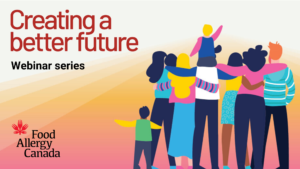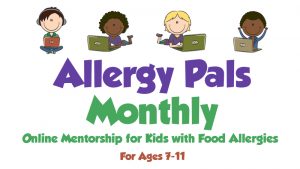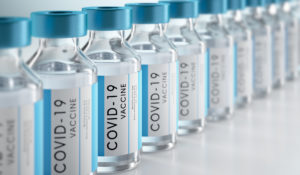Our webinars give you the chance to learn more about food allergy and have your questions answered by experts. Check out the categories below for a listing of our past webinars.
Make sure you sign up to participate in our upcoming webinars.

Latest videos
- Webinar: Food allergy treatment – what is allergen immunotherapy and how has it advanced over the past 5 years?
- Webinar: Recognizing and treating anaphylaxis – why epinephrine and why not Benadryl®
- Webinar: The ins and outs of clinical trials
- Webinar: What’s the big deal about Xolair®?
- Webinar: Immunotherapy & desensitization
- Webinar: What is FPIES and how do you manage it?
- Webinar: EoE in adults: From diagnosis to treatment
- Webinar: Treating anaphylaxis and what you need to know about Benadryl®
- Webinar: Milk allergy: How to manage it and what to consider from a dietary perspective
- Webinar: Making allergy management a habit: Tools to help manage more confidently
- Facebook Live: Treating anaphylaxis with epinephrine auto-injectors
- New series: Listen and Learn
- Webinar recording: Epinephrine, Benadryl®, and the evolving conversation on treatment of anaphylaxis
- New: Video “What is food allergy” with Dr. Philippe Bégin
- New: Video “What is anaphylaxis” with Dr. Philippe Bégin
Early introduction of allergens

- Introducing allergens to babies during COVID-19
- For parents: Updated guidance on the early introduction of allergens
- For healthcare professionals: Early introduction of allergens and food allergy prevention
- For parents in French: Manger tôt. Manger souvent. L’introduction précoce des allergènes et la prévention des allergies alimentaires
Managing food allergy

- Allergy management in school:
- Ask the allergist
- Cow’s milk protein allergy in babies: what is it and how to manage it
- De-mystifying anaphylaxis: uncovering what’s known and what’s not known
- Epinephrine first and the role of Benadryl® in anaphylaxis
- Food allergy and asthma: how do they impact each other
- Food allergy myths
- Facebook Live for families: Using epinephrine auto-injectors for treating anaphylaxis and teaching children to use them
- Facebook Live: How to use epinephrine auto-injectors for treating anaphylaxis
- Going nuts about tree nuts: Learn what’s changed in tree nut allergy
- Managing milk allergy
- Oral food challenges: What they are and how you can gain insight into your food allergy
- The emotional and social challenges experienced by families living with food allergy
- Nourishing children who have food allergy
- Plant-based food trends and the impact to those with food allergy
- Supporting successful transitions into self-management of food allergy: pre-teen to young adult
- Understanding EoE
- Understanding oral allergy syndrome / pollen food allergy syndrome
“Creating a better future” webinar series

- Future outlook of therapies with Dr. Cecilia Berin
- The science behind food allergy with Dr. Elissa Abrams
- The madness behind the numbers – accurate diagnosis, is it possible? with Dr. Edmond Chan
- The truth behind immunotherapy, is it right for you? with Dr. Julia Upton
- Understanding when to use epinephrine with Dr. Moshe Ben-Shoshan
Youth sessions

Foodservice and stock epinephrine

Research and science

For kids aged 7-11 years old

For teens

Food allergy storyteller series with Kyle Dine
- For youth ages 5-14:
Back-to-school encore presentation series

- For elementary/middle school students
- For high school students
- For college/university students
- For parents
- For anyone interested in food allergy
COVID-19 vaccines and food allergy

Watch these past webinars now!
Food allergy, anaphylaxis, and stock epinephrine in foodservice settings
In May 2017, we hosted a webinar that focused on the benefits and consideration for having stock epinephrine in public settings, particularly in foodservice settings. Stock epinephrine is an epinephrine auto-injector (e.g. EpiPen®) that is not prescribed to a specific person and can be used in an emergency.
The webinar was presented by Dr. Susan Waserman, Allergist & Clinical Immunologist, McMaster University and Bethan Dinning, Lawyer, Labour & Employment and Insurance & Tort Liability, Borden Ladner Gervais LLP.
Allergy management in school
For parents:
Watch our back to school webinar that provides an overview of how to manage food allergy in school settings and reviews the many resources available to you.
For students entering post-secondary school:
Watch our webinar on how to navigate post-secondary school, and live safely on campus with food allergies. The webinar is hosted by a panel of youth with food allergies who are currently attending post-secondary school. They share their experiences, insight, and provide strategies on how youth can identify food allergy risks on campus and how to prepare accordingly.
Milk webinar – learn how to manage this complex allergy
In July 2017, we hosted a webinar that provides fundamental information for managing milk allergy. Find how to read labels and learn where milk can be found in prepackaged and prepared foods. Practical advice will be shared on how to communicate with others, how to manage this allergen in the home, and how to prepare your child for school and other social situations.
The science of food allergy – Understanding the research
In November 2017, we hosted a webinar where Dr. Manel Jordana presented the basic science behind food allergy with a focus on the research for allergy prevention, allergy therapies, and what could potentially lead to a cure.
Nourishing children who have food allergy
In November 2017, we hosted a webinar where registered dietitian Linda Kirste discussed how your child can get the nutrients they need to grow and thrive. She covered topics such as alternate food sources that contain key nutrients, menu/recipe strategies, and how to support healthy eating behaviours.
Travelling with food allergies
In June 2018, we hosted a webinar where Kyle Dine, together with a panel of young adults, discussed travelling safely with food allergies. They covered topics such as planning, what to bring and shared tips from their own experiences.
What is oral immunotherapy?
In September 2018, we hosted a webinar where Dr. Julia Upton spoke about oral immunotherapy (OIT), what’s involved in the therapy, who it may be suited for, how long treatment generally takes, the possible side effects, and the goals of treatment. There was an in-depth review of the pros and cons of this emerging new therapy, and a Q&A at the end of the presentation.
Ask the allergist with Dr. Julia Upton
In December 2018, we hosted a webinar where Dr. Upton answered your questions about food allergies and anaphylaxis. The audience was invited to ask allergy-related questions from anything on allergy diagnostics (blood test, skin prick test, oral food challenges), allergy therapies, to introducing allergenic foods to infants, breastfeeding, how to treat reactions, and what’s new in research. The questions received determined the content of this informative webinar, which covers your common questions on:
- allergy testing
- anaphylaxis – reactions and treatment
- oral food challenges
- introduction of food
- research
- and more!
Updated guidance on the early introduction of allergens to prevent the development of food allergies
For parents:
In April 2019, we hosted a webinar where Dr. Elissa Abrams spoke about the Canadian Paediatric Society’s updated recommendations on the early introduction of allergenic foods for high-risk infants.
This webinar is presented by Canadian paediatric allergist Dr. Elissa Abrams who is an Assistant Professor in the Department of Paediatrics, Section of Allergy and Clinical Immunology at the University of Manitoba; and a co-author of the newly released Canadian Paediatric Society (CPS) practice point on the introduction of allergenic foods. She is also Vice Chair of the Anaphylaxis and Food Allergy Section of the Canadian Society of Allergy and Clinical Immunology; and President of the Allergy Section of the CPS.
For parents in French:
For healthcare professionals:
In June 2019, we hosted a webinar for healthcare professionals where Dr. Edmond Chan spoke about the Canadian Paediatric Society’s updated recommendations on the early introduction of allergenic foods for high-risk infants.
This webinar is presented by Canadian pediatric allergist Dr. Edmond Chan who is a UBC Clinical Associate Professor and Head of the Division of Allergy & Immunology in the Department of Pediatrics at BC Children’s Hospital; and a co-author of the newly released Canadian Paediatric Society practice point on the introduction of allergenic foods.
The emotional and social challenges experienced by families living with food allergy
In May 2019, we hosted a webinar where Dr. Joanne Gillespie spoke about the emotional and social challenges experienced by families living with food allergy.
This webinar is presented by Canadian psychologist Dr. Joanne Gillespie who is part of the Pediatric Health Psychology Service at the IWK Health Centre, an associate with Dr. Kathy Hubley Carruthers Counselling & Psychological Services, and a Clinical Associate in the Department of Psychology at Dalhousie University. Dr. Gillespie specializes in health psychology, and has expertise working with preschoolers, school age children, adolescents, and families.
Managing food allergy in high school
In August 2019, we hosted a webinar on how to navigate food allergy in a high school environment, and how to prepare for the transition to high school.
This webinar is presented by Kyle Dine, food allergy educator, and a panel of youth with food allergy who are currently attending high school and are members of Food Allergy Canada’s Youth Advisory Panel.
Food allergy myths
In December 2019, we hosted a webinar on the facts behind some common food allergy myths about food allergens, signs and symptoms, reactions, and more.
This webinar is presented by Canadian allergist Dr. Susan Waserman who is a Professor of Medicine in the Division of Allergy/Clinical Immunology at McMaster University in Hamilton, Ontario, and the Director of the Adverse Reactions Clinic at the Firestone Institute of Respiratory Health at St Joseph’s Healthcare. She is President of the Canadian Allergy, Asthma and Immunology Foundation, and past President of the Ontario and Canadian Societies of Allergy and Clinical Immunology.
Creating a better future webinar series: Future outlook of therapies
In April 2020, we hosted a webinar on the future outlook of therapies that are under study beyond immunotherapy.
This webinar is presented by Dr. Cecilia Berin who is a Professor of Pediatrics and the Deputy Director of the Jaffe Food Allergy Institute, her research is focused on understanding immune mechanisms of allergy and tolerance to foods.
Creating a better future webinar series: The science behind food allergy
In May 2020, we hosted a webinar on the science behind food allergy, how you become sensitized to allergens, what happens to your body during an allergic reaction, and how food allergy can be prevented.
This webinar is presented by Dr. Elissa Abrams who is a Canadian paediatric allergist, an Assistant Professor in the Department of Paediatrics, Section of Allergy and Clinical Immunology at the University of Manitoba, and a co-author of the Canadian Paediatric Society (CPS) practice point on the introduction of allergenic foods. She is Vice Chair of the Anaphylaxis and Food Allergy Section of the Canadian Society of Allergy and Clinical Immunology, and President of the Allergy Section of the CPS. She is also a member of the Healthcare Advisory Board for Food Allergy Canada.
Creating a better future webinar series: The madness behind the numbers – accurate diagnosis, is it possible?
In May 2020, we hosted a webinar on how food allergy is diagnosed, how the results are interpreted, the role of an oral food challenge, and what makes a good candidate for de-labelling.
This webinar is presented by Dr. Edmond Chan who is a Canadian pediatric allergist, a UBC Clinical Associate Professor and Head of the Division of Allergy & Immunology in the Department of Pediatrics at BC Children’s Hospital, and a co-author of the Canadian Paediatric Society practice point on the introduction of allergenic foods. He is on the Board of directors of the Canadian Society of Allergy & Clinical Immunology (CSACI), and on the Executive of the Allergy Section of the Canadian Paediatric Society (CPS). He is also a member of the Healthcare Advisory Board for Food Allergy Canada and steering committee for the National Food Allergy Action Plan.
Creating a better future webinar series: The truth behind immunotherapy, is it right for you?
In June 2020, we hosted a webinar on the different methods of immunotherapy, how the therapies work, and what you should consider if you are thinking about these therapies.
This webinar is presented by Dr. Julia Upton who is on staff at the Hospital for Sick Children in the Immunology and Allergy department; and an Assistant Professor in the Department of Pediatrics at the University of Toronto. She is Chair of the Anaphylaxis and Food Allergy Section of the Canadian Society of Allergy and Clinical Immunology. Dr. Upton is also a member of our Healthcare Advisory Board.
Creating a better future webinar series: Understanding when to use epinephrine
In June 2020, we hosted a session on understanding when to use epinephrine, the role of epinephrine and the importance of using it during anaphylaxis.
This session is presented by Dr. Moshe Ben-Shoshan who is a physician in the division of Allergy/Immunology at Montreal Children’s Hospital. Among other accomplishments, he has established the largest cross-Canada registries that collect data on the diagnosis and management of food allergy, anaphylaxis, drug allergy, and primary immunodeficiencies. He is also a member of the Healthcare Advisory Board for Food Allergy Canada.
Creating a better future youth webinar series: Food allergies don’t define me – With football player Thomas Miles
In May 2020, we hosted a webinar with CFL Grey Cup champion, Thomas Miles. Learn Thomas’ food allergy story and get inspired by how he confidently manages his food allergy while being a professional football player.
This webinar is hosted by Kyle Dine, musician, food allergy educator, and leader of our youth programs.
Creating a better future youth webinar series: Rock your food allergy with Kyle Dine
In May 2020, we hosted a webinar with Kyle Dine, musician, food allergy educator, and leader of our youth programs.
Kyle goes over confidence-boosting strategies that will help youth take control and ownership over the finer details of their food allergy management. With a strong focus on the things youth care most about, Kyle promotes the balance between living a normal pre-teenage and teenage life, and being safe. The presentation contains some out-of-box thinking and tips on how to follow key safety guidelines in creative ways that reflect a youth’s own unique self.
Creating a better future youth webinar series: Managing anxiety and bullying with Samara Carroll
In June 2020, we hosted a webinar on effective and healthy strategies for managing food allergy anxiety and bullying.
This webinar is presented by Samara Carroll, registered social worker and food allergy counsellor. Samantha has worked with children and families in clinical and community settings for more than 10 years. She has been living with food allergy since she was two years old.
The physical and emotional sides of severe allergic reactions: youth session
In August 2020, we hosted a webinar for youth on the signs and symptoms of anaphylaxis, when to use epinephrine, and how to navigate both the physical and emotional sides of allergic reactions.
This webinar is presented by Kyle Dine, food allergy educator and leader of our youth programs, Canadian allergist Dr. Julia Upton, and a panel of youth/young adults with food allergy who share their reaction stories and lessons learned.
Understanding EoE
In October 2020, we hosted a webinar on understanding Eosinophilic Esophagitis (EoE), a type of food allergy that affects the gastrointestinal/digestive tract.
This webinar is presented by pediatric gastroenterologist Dr. Vishal Avinashi and registered dietitian Kirstin Wingate
Dr. Vishal Avinashi is a Pediatric Gastroenterologist at BC Children’s Hospital, involved with the Complex Feeding and Nutrition Service, and is a Co-Director of the Eosinophilic Esophagitis Clinic. He is a Clinical Assistant Professor in the Division of Gastroenterology, Department of Pediatrics at the University of British Columbia.
Kirstin Wingate is a dietitian at BC Children’s Hospital with the Division of Gastroenterology, Hepatology and Nutrition. She has previously worked as a research dietitian with the Department of Pediatrics, Division of Allergy & Immunology at the University of British Columbia.
Plant-based food trends and the impact to those with food allergy
In November 2020, we hosted a webinar on plant-based food trends, like meatless burgers and non-dairy milk, the use of pea protein as a substitute, and more. Find out how these trends may impact you and how to navigate them safely.
This webinar is presented by research scientist Dr. Jennifer Protudjer and food safety expert Beatrice Povolo.
Dr. Jennifer Protudjer is the Endowed Research Chair in Allergy, Asthma and the Environment, and an assistant professor in the Department of Pediatrics and Child Health at the University of Manitoba, an epidemiologist with the Clinical Trials Platform at the George and Fay Yee Center for Healthcare Innovation, and a research scientist at the Children’s Hospital Research Institute of Manitoba.
Beatrice Povolo is Food Allergy Canada’s Director of Advocacy & Media Relations, and the program lead for our food safety initiatives.
Understanding oral allergy syndrome / pollen food allergy syndrome
In April 2021, we hosted a webinar on oral allergy syndrome (OAS), also known as pollen food allergy syndrome (PFAS). Learn the basics of OAS, including symptoms, diagnosis and treatment, reactions and their severity, and how to manage it.
This webinar is presented Dr. Anne Ellis, a Professor of Medicine and Chair of the Division of Allergy & Immunology at Queen’s University, and holds the James H. Day Chair in Allergic Diseases and Allergy Research. She is the Director of the Environmental Exposure Unit and the Allergy Research Unit at Kingston General Hospital, the Vice President of the Canadian Society of Allergy and Clinical Immunology, and also serves on the Joint Task for Practice Parameters which represents the American Academy of Allergy, Asthma and Immunology as well as the American College of Allergy, Asthma and Immunology.
Preventing anaphylaxis in those with food allergy: is it possible?
In May 2021, we hosted a webinar with lead investigator Dr. Manel Jordana about new research on preventing anaphylaxis and what this can mean for food allergy therapies of the future. Learn about the science behind the allergic response, research developments on preventing anaphylaxis, and implications for the treatment of food allergy.
Dr. Manel Jordana, MD, PhD is a Professor in the Department of Medicine at McMaster University. Dr. Jordana is the lead investigator for the new research being shared, which is also featured as an “Editors’ Choice” in the April issue of the Journal of Allergy and Clinical Immunology.
COVID-19 vaccines and food allergy: Get the facts
In February 2021, we hosted a webinar on the COVID-19 vaccines and the impacts to those with food allergy.
This webinar is moderated by Jennifer Gerdts, Executive Director, Food Allergy Canada and features the following experts:
Dr. Megan Bettle: Dr. Bettle has conducted research in molecular biology and the genetics of rare diseases. She joined Health Canada in 2005 as a drug safety reviewer. Since then, she has taken on a number of roles in drug review and safety, cannabis policy, and tobacco and illicit drugs surveillance. Recent positions in the Health Products and Food Branch of Health Canada have focused on developing strategies to improve access to medicines. She is currently the Director General of the COVID-19 Regulatory Response Team for the Health Products and Food Branch.
Dr. Zain Chagla: Dr. Chagla specializes in infectious diseases, internal medicine, and tropical medicine. He is a Consultant Physician at St. Joseph’s Hospital and Hamilton Health Sciences in Ontario, Associate Professor of Medicine at McMaster University, and adjunct faculty at the University of Namibia in the Department of Medicine.
Dr. Elissa Abrams: Dr. Abrams is a Canadian allergist, Chair of the Anaphylaxis and Food Allergy Section of the Canadian Society of Allergy and Clinical Immunology; and President of the Allergy Section of the Canadian Paediatric Society. She is also an Assistant Professor in the Department of Paediatrics, Section of Allergy and Clinical Immunology at the University of Manitoba and is a member of the Healthcare Advisory Board for Food Allergy Canada.
COVID-19 vaccines and food allergy: Is any approved vaccine the best vaccine?
In May 2021, we hosted the second webinar in our COVID-19 vaccines and food allergy series. Learn what vaccines are approved and recommended in Canada, what the likelihood is of having an adverse reaction, what the current perspective is on the duration between the 1st and 2nd dose and mixing vaccines, and more.
This webinar is moderated by Jennifer Gerdts, Executive Director, Food Allergy Canada and features the following experts:
Dr. Megan Bettle: Dr. Bettle has conducted research in molecular biology and the genetics of rare diseases. She joined Health Canada in 2005 as a drug safety reviewer. Since then, she has taken on a number of roles in drug review and safety, cannabis policy, and tobacco and illicit drugs surveillance. Recent positions in the Health Products and Food Branch of Health Canada have focused on developing strategies to improve access to medicines. She is currently the Director General of the COVID-19 Regulatory Response Team for the Health Products and Food Branch, Director, Centre for Regulatory Excellence, Health Canada.
Dr. Zain Chagla: Dr. Chagla specializes in infectious diseases, internal medicine, and tropical medicine. He is a Consultant Physician at St. Joseph’s Hospital and Hamilton Health Sciences in Ontario, Associate Professor of Medicine at McMaster University, and adjunct faculty at the University of Namibia in the Department of Medicine.
Dr. Harold Kim: Dr. Kim is an allergist, Adjunct Professor at the University of Western Ontario and Assistant Clinical Professor at McMaster University. He is the Past President of the Canadian Society of Allergy and Clinical Immunology (CSACI) and current co-lead of the National Food Allergy Action Plan. He is an expert involved in a peer-reviewed article on the topics of COVID-19 and allergy. He also contributed to the CSACI statement on COVID-19 vaccination.
COVID-19 vaccines and food allergy: What to know about vaccines for children and teens
In July 2021, we hosted the third webinar in our COVID-19 vaccines and food allergy series. Find out about the approved vaccine options and recommended ages, and what to consider if a child/teen has a food allergy.
This webinar is moderated by Jennifer Gerdts, Executive Director, Food Allergy Canada and features the following experts:
Dr. Megan Bettle: Dr. Bettle has conducted research in molecular biology and the genetics of rare diseases. She joined Health Canada in 2005 as a drug safety reviewer. Since then, she has taken on a number of roles in drug review and safety, cannabis policy, and tobacco and illicit drugs surveillance. Recent positions in the Health Products and Food Branch of Health Canada have focused on developing strategies to improve access to medicines. She is currently the Director General of the COVID-19 Regulatory Response Team for the Health Products and Food Branch.
Dr. Zain Chagla: Dr. Chagla specializes in infectious diseases, internal medicine, and tropical medicine. He is a Consultant Physician at St. Joseph’s Hospital and Hamilton Health Sciences in Ontario, Associate Professor of Medicine at McMaster University, and adjunct faculty at the University of Namibia in the Department of Medicine.
Dr. Julia Upton: Dr. Upton is on staff at the Hospital for Sick Children in the Immunology and Allergy department; and is an Associate Professor in the Department of Paediatrics at the University of Toronto. She is the past Section Chair of the Anaphylaxis and Food Allergy Section of the Canadian Society of Allergy and Clinical Immunology (CSACI), and is a member of the Healthcare Advisory Board for Food Allergy Canada. She is also a co-author of the CSACI statement on allergy management regarding the COVID-19 vaccine.
COVID-19 vaccines and kids with food allergy – what parents need to know
With the approval of COVID-19 vaccines for kids 5-11 in Canada, watch our discussion with our panel of experts to learn more and get answers to top questions. This session will provide you with the most up-to-date information from three experts to help inform your decisions on this important public health priority.
This webinar is moderated by Jennifer Gerdts, Executive Director, Food Allergy Canada and features the following experts:
Celia Lourenco: Celia holds a PhD in Pharmacology and has been the Director General of the Biologic and Radiopharmaceutical Drugs Directorate (BRDD) of the Health Products and Food Branch of Health Canada since November 2018. BRDD is the federal regulatory authority responsible for regulating a variety of drug products for the Canadian market, including vaccines. Celia is also the co-chair of the COVID-19 working group of the International Coalition of Medicines Regulatory Authorities.
Dr. Zain Chagla: Dr. Chagla specializes in infectious diseases, internal medicine, and tropical medicine. He is a Consultant Physician at St. Joseph’s Hospital and Hamilton Health Sciences in Ontario, Associate Professor of Medicine at McMaster University, and adjunct faculty at the University of Namibia in the Department of Medicine
Dr. Julia Upton: Dr. Upton is on staff at the Hospital for Sick Children in the Immunology and Allergy department; and is an Associate Professor in the Department of Paediatrics at the University of Toronto. She is the past Section Chair of the Anaphylaxis and Food Allergy Section of the Canadian Society of Allergy and Clinical Immunology (CSACI), and is a member of the Healthcare Advisory Board for Food Allergy Canada. She is also a co-author of the CSACI statement on allergy management regarding the COVID-19 vaccine.
Your questions answered on introducing allergens to babies during COVID-19
In May 2020, we hosted a Q/A webinar on introducing allergens to babies during COVID-19, and beyond. Learn what to watch for in terms of allergic reactions, and how to treat reactions if they happen.
This webinar is presented by Canadian paediatric allergists Dr. Elissa Abrams and Dr. Edmond Chan, the co-authors of the Canadian Paediatric Society’s practice point on the introduction of allergenic foods.
Dr. Elissa Abrams is a Canadian paediatric allergist, an Assistant Professor in the Department of Paediatrics, Section of Allergy and Clinical Immunology at the University of Manitoba, and a co-author of the Canadian Paediatric Society (CPS) practice point on the introduction of allergenic foods. She is Vice Chair of the Anaphylaxis and Food Allergy Section of the Canadian Society of Allergy and Clinical Immunology, and President of the Allergy Section of the CPS. She is also a member of the Healthcare Advisory Board for Food Allergy Canada.
Dr. Edmond Chan is a Canadian pediatric allergist, a UBC Clinical Associate Professor and Head of the Division of Allergy & Immunology in the Department of Pediatrics at BC Children’s Hospital, and a co-author of the Canadian Paediatric Society practice point on the introduction of allergenic foods. He is on the Board of directors of the Canadian Society of Allergy & Clinical Immunology (CSACI), and on the Executive of the Allergy Section of the Canadian Paediatric Society (CPS). He is also a member of the Healthcare Advisory Board for Food Allergy Canada and steering committee for the National Food Allergy Action Plan.
Facebook Live: How to use epinephrine auto-injectors for treating anaphylaxis with Dr. Julia Upton
In March 2021, we hosted a Facebook Live session on how to use the different auto-injectors in Canada, including EpiPen®, ALLERJECT® and Emerade™, and how these devices are used to treat anaphylaxis. You’ll gain a better understanding of the device options, their administration techniques, and get your questions addressed on anaphylaxis.
Our guest speaker is Dr. Julia Upton, who is on staff at the Hospital for Sick Children in the Immunology and Allergy department; and an Associate Professor in the Department of Paediatrics at the University of Toronto. She is the past Section Chair of the Anaphylaxis and Food Allergy Section of the Canadian Society of Allergy and Clinical Immunology. Dr. Upton is also a member of our Healthcare Advisory Board.
Epinephrine first and the role of Benadryl® in anaphylaxis
In May 2021, we hosted a webinar with Dr. Wade Watson on why epinephrine is the first-line treatment for anaphylaxis, and what role, if any, antihistamines have during a reaction. With this session, build your confidence in learning how to recognize anaphylaxis and what to do in case you or someone you know experiences it.
Dr. Wade Watson is a Professor of Pediatrics, Dalhousie University, Head of the Division of Allergy, IWK Health Centre, and Chair of the Specialty Committee, Clinical Immunology and Allergy, Royal College of Physicians and Surgeons of Canada. Dr. Watson is also a member of our Healthcare Advisory Board.
Webinar for youth: What’s it like to go to middle school and high school with food allergy
In August 2021, we hosted a webinar with Kyle Dine and members of our Youth Advisory Panel (YAP) on how to manage the transition to middle school and high school with food allergy.
Topics covered include how to talk about food allergy with peers and teachers, dealing with unwanted teasing or bullying, how to stay safe during snack/lunch times and the importance of carrying an epinephrine auto-injector and knowing how to treat reactions.
For parents: Supporting successful transitions into self-management of food allergy: pre-teen to young adult
In August 2021, we hosted a webinar with Dr. Rebecca Knibb on supporting successful transitions into self-management of food allergy. With this webinar, you’ll gain a better understanding of the mental health aspects that youth may experience on the path to independence and learn practical strategies on how to successfully manage these transitions.
Dr. Rebecca Knibb is an Associate Professor in Psychology at Aston University in Birmingham, UK. She is also a Chartered Psychologist and practitioner Health Psychologist with 25 years of experience in conducting research into the psychological impact of allergies. She is involved in the development of strategies to help families cope through cognitive behavioural therapy (CBT) based behaviour change methods and is particularly interested in how children cope with the transition to adolescence and cope with leaving home.
Understand the severity of your food allergy
In September 2021, we hosted a webinar with Dr. Philippe Bégin on what makes your food allergy severe. In this session, you will be introduced to the concept of thresholds (the lowest amount of a food allergen that can trigger a reaction), how co-factors and other mechanisms/therapies can lower the threshold at which one reacts, and an exploration on how they all relate to understanding the potential severity of food allergy and why for some it is not as severe and only mildly uncomfortable, while with others it can be life-threatening.
Dr. Philippe Bégin is a clinician-scientist and assistant professor at the CHUM (Centre hospitalier de l’Université de Montréal) and the CHU Sainte-Justine (Centre hospitalier universitaire Sainte-Justine), and teaches allergy and immunology at the Université de Montréal. He is the director of the public oral immunotherapy clinic at the Sainte-Justine. Dr. Bégin is on the Board of Directors of the Canadian Society of Allergy and Clinical Immunology and is a member of the Healthcare Advisory Board for Food Allergy Canada.
Cow’s milk protein allergy in babies: what is it and how to manage it
In November 2021, we hosted a webinar on cow’s milk protein allergy in babies. In this session, you’ll gain a better understanding of this medical condition along with practical management strategies that families can follow, from our guest speakers including an allergist and a registered dietitian.
Dr. Julia Upton is a Canadian allergist who is on staff at the Hospital for Sick Children in the Immunology and Allergy department; and is an Associate Professor in the Department of Paediatrics at the University of Toronto. She is the past Section Chair of the Anaphylaxis and Food Allergy Section of the Canadian Society of Allergy and Clinical Immunology. Dr. Upton is also a member of Food Allergy Canada’s Healthcare Advisory Board.
Ahuva Magder is a registered dietitian who manages a private practice with a special focus on paediatric health; and also supports community paediatric clinics. She has previously worked as a clinical research dietitian in the Food Allergy Program at the Hospital for Sick Children.
Food allergy and asthma: how do they impact each other
In March 2022, we hosted a webinar on food allergy and asthma with two expert guests, Dr. Mariam Hanna and Dr. Doug Mack. In this session, you’ll gain you’ll learn how these conditions are related and how they can be successfully managed.
Dr. Mariam Hanna is a Pediatric Allergy, Asthma and Immunology Specialist. She is an Assistant Clinical Professor (Adjunct) in the Department of Pediatrics at McMaster University and the Section Chair in Allergy & Immunology for the Ontario Medical Association.
Dr. Doug Mack is a Pediatric Allergy, Asthma and Immunology Specialist. He is an Assistant Clinical Professor in the Department of Pediatrics at McMaster University, on the Board of Directors for the Canadian Society of Allergy and Clinical Immunology, and on the Executive for Allergy & Immunology for the Ontario Medical Association.
De-mystifying anaphylaxis: uncovering what’s known and what’s not known
In May 2022, we hosted a webinar on de-mystifying anaphylaxis with Canadian allergists Dr. Philippe Bégin and Dr. Julia Upton. In this session, you’ll learn fact from fiction, including whether each allergic reaction becomes increasingly worse or more severe, whether a trace amount of an allergen triggers anaphylaxis, and more.
Dr. Philippe Bégin, clinician-scientist and assistant professor at the CHUM (Centre hospitalier de l’Université de Montréal) and the CHU Sainte-Justine (Centre hospitalier universitaire Sainte-Justine), and teaches allergy and immunology at the Université de Montréal. He is the director of the public oral immunotherapy clinic at the Sainte-Justine. Dr. Bégin is on the Board of Directors of the Canadian Society of Allergy and Clinical Immunology and is a member of our Healthcare Advisory Board.
Dr. Julia Upton is on staff at the Hospital for Sick Children in the Immunology and Allergy department; and an Associate Professor in the Department of Paediatrics at the University of Toronto. She is the past Section Chair of the Anaphylaxis and Food Allergy Section of the Canadian Society of Allergy and Clinical Immunology. Dr. Upton is also a member of our Healthcare Advisory Board.
Facebook Live for families: Using epinephrine auto-injectors for treating anaphylaxis and teaching children to use them
In May 2022, we hosted a Facebook Live session with Dr. Julia Upton on how to use the different auto-injectors in Canada, including EpiPen®, ALLERJECT® and Emerade™, for treating anaphylaxis. In this session, you’ll gain a better understanding of the signs and symptoms of anaphylaxis, the administration techniques of each device, and how to teach children to use them. This session is also available to watch in French with Dr. Philippe Bégin.
Dr. Julia Upton is on staff at the Hospital for Sick Children in the Immunology and Allergy department; and an Associate Professor in the Department of Paediatrics at the University of Toronto. She is the past Section Chair of the Anaphylaxis and Food Allergy Section of the Canadian Society of Allergy and Clinical Immunology. Dr. Upton is also a member of our Healthcare Advisory Board.
For parents: Ask your questions live!
In August 2022, we hosted a webinar featuring a panel of students with food allergy. During this session, the youth panel answered your questions on eating in schools, how to get teachers and peers to be supportive, how anaphylaxis has been handled at school, along with managing social situations, bullying, and more.
Oral food challenges: What they are and how you can gain insight into your food allergy
In August 2022, we hosted a webinar on oral food challenges (OFCs) with Dr. Edmond Chan. In this session, you’ll learn about the role of OFCs, what they can tell you, who is the best candidate for an OFC, what they involve, what to ask your allergist when considering one, and more.
Dr. Chan is a Pediatric Allergist at the BC Children’s Hospital (BCCH) Allergy Clinic, University of British Columbia (UBC) Clinical Professor, Clinical Investigator (BCCH Research Institute), and Head (UBC Division of Allergy & Immunology, BCCH), where he leads a food allergy research program. He is Secretary-Treasurer of the Canadian Society of Allergy and Clinical Immunology, on the Executive of the Canadian Paediatric Society’s Allergy Section, and on Food Allergy Canada’s Healthcare Advisory Board, and steering committee for Canada’s National Food Allergy Action Plan.
Going nuts about tree nuts: Learn what’s changed in tree nut allergy
In December 2022, we hosted a webinar with Canadian allergist Dr. Douglas Mack on how tree nut allergy management has changed and what it may mean for affected individuals, like the ability to eat certain tree nuts.
Dr. Douglas Mack is a Pediatric Allergy, Asthma and Immunology Specialist. He is an Assistant Clinical Professor in the Department of Pediatrics at McMaster University, on the Board of Directors for the Canadian Society of Allergy and Clinical Immunology, and on the Executive for Allergy & Immunology for the Ontario Medical Association.
Cow’s milk allergy: A closer look at development and prevention in infancy
Watch to hear from Dr. Edmond Chan on cow’s milk allergy development and prevention in infancy. This webinar is targeted to expectant and new parents, dietitians, nurses, and other healthcare professionals who provide pre-natal and post-natal support to hear the latest evidence on the prevention of cow’s milk allergy. Dr. Edmond Chan is a Pediatric Allergist at the BC Children’s Hospital (BCCH) Allergy Clinic, UBC Clinical Professor, Clinical Investigator at BCCH Research Institute, and Head of the BCCH Division of Allergy & Immunology, where he leads a food allergy research program. He is a co-author of several national/international guidelines on food allergy, including the Canadian Paediatric Society’s (CPS) position statement on dietary exposures and allergy prevention in high-risk infants. Dr. Chan is Vice President of the Canadian Society of Allergy and Clinical Immunology (CSACI), on the Executive of the CPS’ Allergy Section, and on Food Allergy Canada’s Healthcare Advisory Board, and steering committee for Canada’s National Food Allergy Action Plan.
Making allergy management a habit: Tools to help manage more confidently
Join Sarah Nicholl to learn about the science of habits and how to develop ones that can support your family’s food allergy management goals. This is a perfect session for families and youth to help them get ready for the new school year.
What the webinar is about: Learn how behavioural science can help you form good food allergy management habits and build them into your daily life. You’ll learn:
- How our thinking supports habits
- Top habits for food allergy management
- How to develop habits for you and your family
- Ways to support your child in their food allergy management
- Checklists to monitor progress and keep you on track
Food Allergy Storyteller series with Kyle Dine
In April 2020, we hosted Facebook Live sessions with food allergy educator and musician Kyle Dine. Kyle is joined by his 4 year-old daughter Zora as he tells the stories and life lessons behind a few of his food allergy songs.
Episode 1: Allergy Attitude
Episode 2: Allergy Safety
Episode 3: Allergy Empowerment
Back-to-school encore presentation series
Introducing our “encore presentation series” where we feature past online events and webinars. Below you can watch our back-to-school series to help you and your kids prepare for the new school year. Although this school year will be different due to the pandemic, many of the tips and recommendations from our previous sessions still apply.
You’ll learn tips for managing food allergy confidently, navigating in different school environments, communicating your allergies with others, the role and importance of using epinephrine as the first-line treatment for anaphylaxis, and more.
Check out the videos for youth and adults below and share with others who may benefit!
For youth
For elementary/middle school students:
Topic: Back-to-school with food allergies
Learn how to speak up about your food allergy, how to deal with unwanted teasing or bullying, how to stay safe at lunch/snack time, spreading allergy awareness at school, and the importance of carrying your auto-injector with you at all times.
Topic: Food allergies and epinephrine
Learn how epinephrine treats anaphylaxis, not to be afraid of using it, and stories on reactions and using epinephrine. Plus, learn how to practice by using an auto-injector training device, tips on remembering to carry your auto-injector, and ways to carry and take care of it.
For high school students:
Topic: Managing food allergy in high school
Learn what to expect, tips and strategies for managing in a high school environment, and how to prepare for the transition. Hear from a panel of youth with food allergy on first-hand experiences, learn how to educate others and build a support system, and discover relevant resources to prepare.
For college/university students:
Topic: Managing food allergies in college/university
Learn tips and best practices on how to navigate post-secondary school, and live safely on campus with food allergy. Hear from a panel that shares their experiences, insight, and strategies on how youth can identify food allergy risks on campus and how to prepare accordingly.
For parents
Topic: Back-to-school top tips for managing food allergy at school
Learn the top tips for managing food allergy at school and discover the many school resources we have available to support you and your child.
For anyone interested in food allergy
Topic: Managing anxiety and bullying with Samara Carroll
Learn effective and healthy strategies on how to manage food allergy and learn how to deal with bullying if it happens.
Topic: The emotional and social challenges experienced by families living with food allergy
Learn about the potential impact living with food allergy has on children, siblings, and caregivers and ways to address the range of emotions experienced by families.
Allergy Pals Monthly
Beginning in July 2017, we launched monthly webinars just for kids as a part of our Allergy Pals program. Every other month, kids with food allergies that are between the ages of 7-11 participate in webinars that will cover key educational information on managing food allergies.
Each webinar is led by a trained peer mentor with food allergies where they will highlight a different topic each month, such as birthday parties, friends, school, and bullying. There are also be plenty of interactive games and activities that will have your child glued to the presentation!
Watch the past webinars below or register today for an upcoming session!



